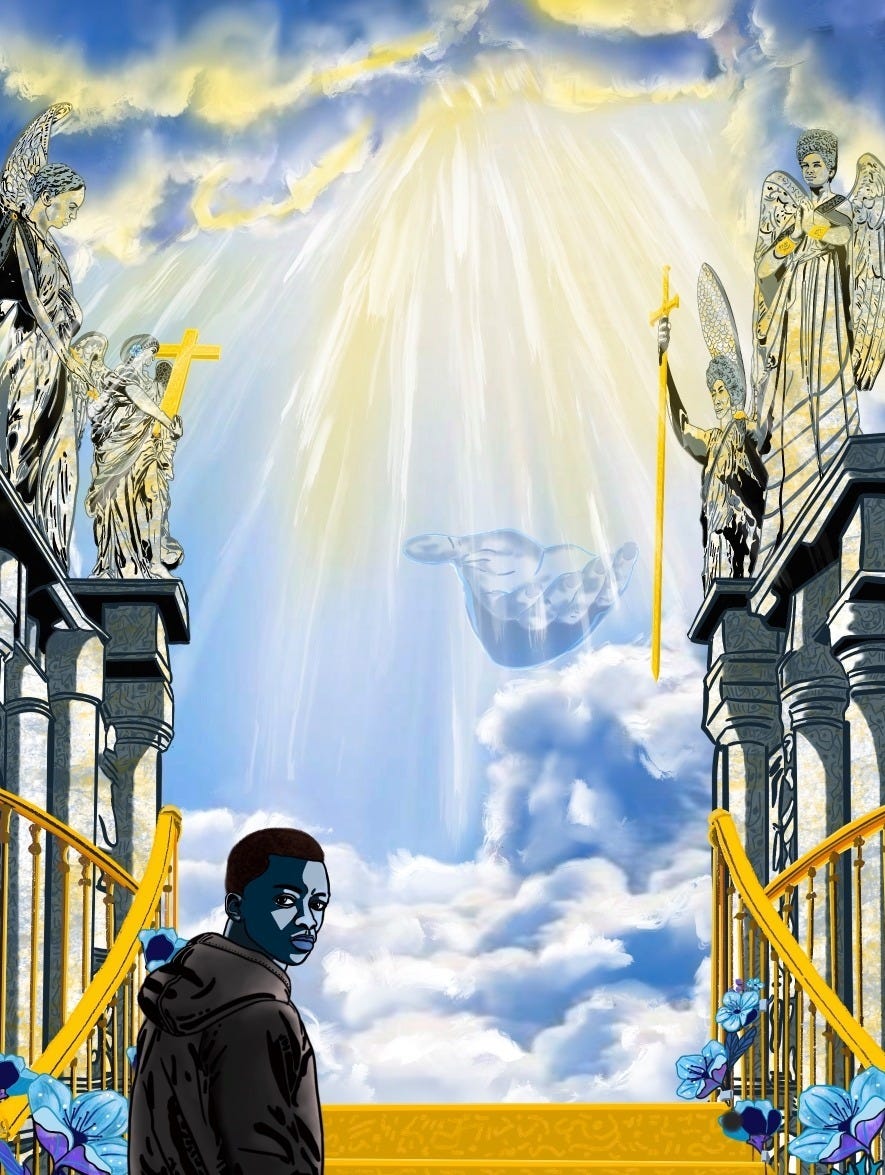Theatre Review: The Ever-Expanding Moment
What happens when a Black man killed by the police is trapped in the afterlife with the white officer who shot him? Artists Up Close Reviews "The Ever-Expanding Moment" by Amontaine Aurore.
Amontaine Aurore’s multimedia stage play The Ever-Expanding Moment is premiering at Common Area Maintenance (CAM) in Belltown, Seattle until September 22, 2024. This 90-minute performance delivers emotional intensity and narrative complexity, tackling pressing social issues and deep existential dilemmas.
What happens when a Black man killed by the police is trapped in the afterlife with the white officer who shot him? Jamahl King (Anthony Simmons) is an ambitious college student expecting a child, while Victor Lane (Daniel Christensen) is a seasoned yet jaded cop, resigned to accepting the police force’s culture of callousness and indifference. Together, they confront their pasts, their emotional wounds, and their complex relationships. The Angel Sophelia (Zoë Wolf) serves as a guide taking on the role of mother, wife, and judge, steering both souls through their interconnected afterlife journeys. While the time period is unstated, the themes of police brutality and accountability ground it in a present-day context, wrapped in an otherworldly soundscape and mesmerizing visuals projected onto stage panels.
Set on a black box stage, The Ever-Expanding Moment uses minimal props, low lighting, and simple set design. Yet, it remains visually dynamic through actor movement, projected visuals, and narratively responsive sound effects. This trifecta of movement, visuals, and sound make the bare space feel alive and full, even crowded, at times. It tickled my senses as I experienced a wide range of emotions—startled, intrigued, saddened, hopeful, and angry—while feeling an ever-present, deep sense of grief throughout the story. There was also laughter, a lot of it. Despite the very serious nature of the play, the audience laughed at every comedic moment, providing just the right amount of relief in the otherwise tense narrative.
On its surface, The Ever-Expanding Moment seems like a play about the afterlife consequences of police brutality but it digs deeper than that. This play explores what happens when two human beings, separated by circumstances and societal boundaries, are forced to confront each other, their self-perceptions, and their response to the societal expectations placed on them during their lifetime. It’s also about the struggle to find light in a world filled with darkness and the courage required to challenge the culture we’re born into.
Aurore’s expert storytelling immerses us in the lives of both characters, portraying them as fully human—flawed, yet driven by good intentions. And while there were moments where Jamahl’s dialogue wasn’t believable, it didn’t diminish the emotional impact of the story. At one point I wondered if the unnatural dialogue was intentional. Since Jamahl was a college student, I imagined that maybe the playwright intended to demonstrate how the character was awkwardly regurgitating ideas he had read in books. The lighting design was powerful overall but there were times when it detracted from the experience—actors sometimes performed in shadow, making it difficult to see their facial expressions. Unfortunately, this lessened the dramatic impact. One of the most creative technical aspects was the use of stage panels, which shifted between opaque and translucent, effectively transporting the audience through time, space, and multiple dimensions. The emotional range of all three actors was impressive, enriching the experience—I didn’t take my eyes off them, not even for a moment.
The Ever-Expanding Moment is Amontaine Aurore’s third major play produced in Seattle since 2018. Her play Don’t Call It A Riot premiered at 18th & Union in 2018 and When A Tree Falls, a filmed theatre production, premiered at SIFF Cinema in 2023 during the heart of the pandemic. All three of Aurore’s plays explore what it means to live in a society that racializes its people. They boldly delve into how this racialization impacts inner lives, personal relationships, and the ability to exist and find joy despite circumstances.
Many of Aurore’s contemporaries have explored the emotional and existential impacts of police brutality. Based on summaries and reviews, plays like Antoinette Chinonye Nwandu’s Pass Over (2017) and Anna Deavere Smith’s Twilight: Los Angeles, 1992 (1993) focus on the psychic toll of police violence. But Aurore’s play stands out because she uses a narrative framework similar to Jean-Paul Sartre’s 1944 existentialist play No Exit, placing it in a modern American context. When Sartre’s idea that “hell is other people” is applied to America’s racial and policing dynamics, it forces the audience to question their understanding of the world and their place in it.
The Ever-Expanding Moment delivers rich storytelling with an emotional punch, challenging audiences to rethink their understanding of the culture they live in and their assumptions about “the other.” It uses classic existential frameworks to explore current social realities in a way that’s fresh and creative. And it takes simple, barebones staging and breathes life into it with mostly effective lighting and sound design. For anyone willing to experience its emotional and intellectual depths, The Ever-Expanding Moment is an unforgettable and rewarding experience.
© Copyright 2024 - Artists Up Close/Beverly Aarons. All rights reserved.


